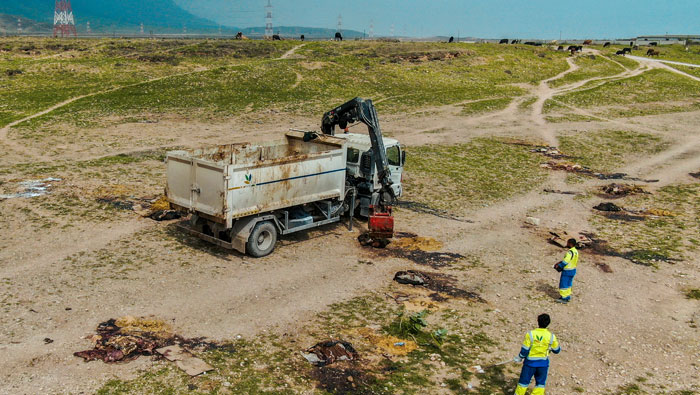
Muscat: Waste during Eid Al Adha increased over 60 per cent compared to other days, according to the Oman Environmental Services Holding Company (be’ah).
A statement by the company read: “Landfills throughout the Sultanate have received large quantities of municipal and slaughter waste during the Eid holiday.
“The quantity of waste received at landfills is estimated to be more than 30 thousand tonnes.”
Fatma Al Mujaini, Acting Municipal Waste Sector Strategies Manager at be’ah, said: “ The quantity of municipal and slaughter waste has increased during the period between 11th-15th August to reach more than 30 thousand tonnes; an increase of 60 per cent compared to the waste quantity rate on normal days.”
This is a massive increase even compared to the Eid Al Fitr holiday after Ramadhan, when the amount of waste swelled to 20,000 tonnes, a 30 per cent increase on other periods.
Mohammed Al Maamari, Regional Operations Manager at be’ah, said that a total of 7,092 tonnes of waste have been collected during Eid from North Al Batinah (110 per cent increase compared to normal days) with a 100 per cent increase in waste from South Al Batinah and 70 per cent increase from Musandam and Al Dhahirah.
“These numbers mean that we need more effort, labour, and equipment,” Al Maamari explained.
**media[1050367]**
Tremendous effort
A spokesman said “be’ah has been putting tremendous effort in tackling the large quantities of waste by collecting it and disposing of it at engineered landfills.
“It makes sense that this Eid had more waste compared to last, since Eid Al Adha has more waste from slaughter and the cooked meats that we have in Oman.”
This time, Eid happened to occur during the Khareef season, which has led to a challenge in Dhofar.
Mohammed bin Alawi Muqaibel, the Director of Operations in Dhofar said: “One of the hardest challenges be’ah has faced during the Eid holiday was that it came during the peak of the Khareef season. This caused extra work for the operating company as they had to collect slaughter waste from where it had been randomly dumped by people who had not called be’ah to report it”. He added that the challenges regarding choosing sites for the proper disposal of slaughter waste are being discussed with the authorities including Dhofar Municipality and the Directorate General of Environment and Climate Affairs.
**media[1050368]**
Dhofar was given extra skips of various sizes to handle slaughter waste, which reached which reached 497 tonnes during the holiday, while municipal solid waste rose to 3,728 tonnes, a 68 per cent increase on normal rates. be’ah has been working to contain the increase in waste during this period.
Al Mujaini added, “be’ah has been working closely with service providers in different governorates to put a complete and efficient plan in order to tackle the increasing quantities of municipal and slaughter waste that was expected to be generated during Eid Al Adha.”
The company has been supporting existing resources, such as bins, equipment, labour, and trucks, with additional ones to collect and transport waste before and during Eid holiday. Large skips, which are used as collection points for slaughter waste, have been distributed in most governorates.
**media[1050370]**
Extensive collection
Regarding operations during Eid Al Adha, Mohammed Al Maamari, Regional Operations Manager at be’ah explained, “Eid is an exceptional event for our team, since we work 24 hours a day during the holiday. Our operations include distribution of hundreds of special slaughter skips, extensive collection of waste to make sure that it does not pile up and the cleaning and sanitisation of bins.